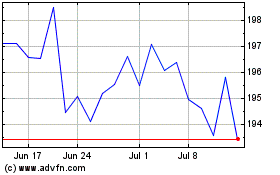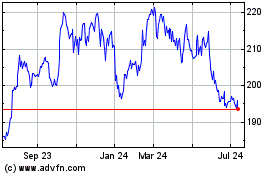UPDATE: CME-CBOE Tax Relief Won't Start Until Mid-2012 - Lawmaker
November 27 2011 - 6:52PM
Dow Jones News
Illinois legislative leaders put the final touches Sunday on a
scaled-back plan for tax relief that they still hope will be
sufficient to keep derivatives exchange CME Group Inc. (CME) in
Illinois, where it has had its headquarters for 163 years.
CME and options exchange CBOE Holdings Inc. (CBOE) would be
taxed on 27.54% of all electronic trades, which account for the
vast majority of the business performed at the exchanges, based on
the final draft of the legislation.
However, tax breaks won't kick in until the start of the next
fiscal year, which begins July 1, 2012.
Initially, the exchanges sought to have tax relief take effect
for the current fiscal year.
The delay represents "significant concessions" by the exchanges,
which enable the cash-starved state to pay its bills this year,
said Democratic Representative John Bradley, chairman of the House
Revenue and Finance Committee.
Currently, the exchanges pay taxes on 100% of the electronic
transactions. State officials came up with the 27.54% figure, using
U.S. census data to estimate the proportion of the trades performed
in Illinois.
Exchanges are able to attract global market participants because
of their electronic platforms.
CME and CBOE protested the state legislature's action in January
to raise the corporate tax rate to 7% from 4.8%, an increase
costing CME an extra $50 million per year, according to CME
Chairman Terry Duffy.
Duffy said it was "not acceptable" that CME accounts for 6% of
all corporate taxes paid to the Illinois government, and that the
exchange's board of directors was mulling over "very, very
lucrative" offers to move its headquarters to other states.
All that would remain in Illinois, according to Duffy, would be
the trading floors at the Chicago Board of Trade, which account for
less than 5% of CME's business.
CME and CBOE representatives declined to comment Sunday.
The bill allows competing exchanges to opt out of the new taxing
method, after an executive of IntercontinentalExchange Inc. (ICE)
said the change might raise costs for the Atlanta-based
exchange.
ICE earns a "significant allocation of our income" from
Illinois, Martin Hunter, an ICE vice president told the state House
committee on Nov. 18.
Facing criticism for aiding profitable exchanges, lawmakers and
Democratic Governor Pat Quinn attempted to make the measure
politically palatable by including incentives to keep Sears
Holdings Corp. (SHLD) in Illinois, extend research and development
tax credits for all state businesses, and provide earned income tax
credits and personal exemptions for workers.
The tax package presented to lawmakers this week will cost the
state about $250 million, slashing about $630 million from the
earlier version of the bill.
For example, the measure provides $55 million in earned income
tax credits for state workers, down from $290 million as proposed
by the Governor, said Bradley.
"People make compromises, and that's what we're seeing here
today," he added.
The ranking Republican on the committee, David Harris, is
backing the revised tax bill, according to Bradley.
Bradley hopes to have the bill approved by both the state House
and Senate, and signed by the Governor by the end of this week.
-By Howard Packowitz, Dow Jones Newswires; 312-750-4132;
howard.packowitz@dowjones.com
CME (NASDAQ:CME)
Historical Stock Chart
From May 2024 to Jun 2024

CME (NASDAQ:CME)
Historical Stock Chart
From Jun 2023 to Jun 2024
